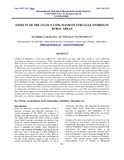Please use this identifier to cite or link to this item:
https://cris.library.msu.ac.zw//handle/11408/1781| Title: | Effects of the State’s long hand on struggle stories in rural areas | Authors: | Chakawa, Joshua Nyawo-Shava, Vongai Z. |
Keywords: | Reconciliation, rural communities, Zimbabwe, liberation war | Issue Date: | Sep-2013 | Publisher: | International Research Journals | Series/Report no.: | International Journal of Research in Social Sciences;Vol. 3, No. 1; p. 45-52 | Abstract: | Civilians in Zimbabwe’s rural areas suffered the wrath of the war more than other groups as rival combatants descended on them each exerting force. Their experience of wartime violence, coercion and repression has taught them to be less willing to share sensitive war time stories with anyone who is a stranger to their network. More often, they are prepared to say a lot in praise of guerrilla movements and the ZANU PF party, but not much against it. Others are not even prepared to share any wartime stories out of fear that they might be sniffed out by the ears and eyes of the state. This is particularly so to blacks who fought the war on the side of the minority white regime.Their fears go a long way in highlighting that the reconciliation process did not extend to the grassroots and neither was the state fully committed to grassroots reconciliation. The lack of preparedness on the part of communities in rural areas to freely discuss their wartime experiences is an indication of the real or imagined power of the postcolonial state in Zimbabwe. The paper relies on information from Hurungwe district where nationalist guerrillas of the Zimbabwe People’s Revolutionary Army (ZIPRA) fought the liberation war between 1972 and 1980. These guerrillas were presented in Rhodesian propaganda as Ndebele invader out to re-colonise the Shona of Hurungwe because most of these guerrillas came from southern parts of the country which made them fluent in Ndebele. Prior to colonization, the Shona were in theory under Ndebele rule but in practice, only 30% were indeed dominated by them. This paper suggests various mechanisms which could be employed in order to extract as much information as possible from rural informants. It also brings to light other challenges associated with the study of Zimbabwe’s liberation war which are independent of the state’s long arm | URI: | http://hdl.handle.net/11408/1781 | ISSN: | 2307-227X |
| Appears in Collections: | Research Papers |
Files in This Item:
| File | Description | Size | Format | |
|---|---|---|---|---|
| history.pdf | Full Text | 599.77 kB | Adobe PDF |  View/Open |
Page view(s)
122
checked on Feb 10, 2026
Download(s)
70
checked on Feb 10, 2026
Google ScholarTM
Check
Items in MSUIR are protected by copyright, with all rights reserved, unless otherwise indicated.



